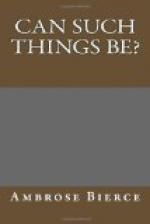Something in Bartine’s manner that was not in his words—I hardly knew what it was—prompted me to ask:
“What is your view of the matter—of the justice of it?”
“My view of it,” he flamed out, bringing his clenched hand down upon the table as if he had been in a public house dicing with blackguards—“my view of it is that it was a characteristically dastardly assassination by that damned traitor, Washington, and his ragamuffin rebels!”
For some minutes nothing was said: Bartine was recovering his temper, and I waited. Then I said:
“Was that all?”
“No—there was something else. A few weeks after my great-grandfather’s arrest his watch was found lying on the porch at the front door of his dwelling. It was wrapped in a sheet of letter paper bearing the name of Rupert Bartine, his only son, my grandfather. I am wearing that watch.”
Bartine paused. His usually restless black eyes were staring fixedly into the grate, a point of red light in each, reflected from the glowing coals. He seemed to have forgotten me. A sudden threshing of the branches of a tree outside one of the windows, and almost at the same instant a rattle of rain against the glass, recalled him to a sense of his surroundings. A storm had risen, heralded by a single gust of wind, and in a few moments the steady plash of the water on the pavement was distinctly heard. I hardly know why I relate this incident; it seemed somehow to have a certain significance and relevancy which I am unable now to discern. It at least added an element of seriousness, almost solemnity. Bartine resumed:
“I have a singular feeling toward this watch—a kind of affection for it; I like to have it about me, though partly from its weight, and partly for a reason I shall now explain, I seldom carry it. The reason is this: Every evening when I have it with me I feel an unaccountable desire to open and consult it, even if I can think of no reason for wishing to know the time. But if I yield to it, the moment my eyes rest upon the dial I am filled with a mysterious apprehension—a sense of imminent calamity. And this is the more insupportable the nearer it is to eleven o’clock—by this watch, no matter what the actual hour may be. After the hands have registered eleven the desire to look is gone; I am entirely indifferent. Then I can consult the thing as often as I like, with no more emotion than you feel in looking at your own. Naturally I have trained myself not to look at that watch in the evening before eleven; nothing could induce me. Your insistence this evening upset me a trifle. I felt very much as I suppose an opium-eater might feel if his yearning for his special and particular kind of hell were re-enforced by opportunity and advice.
“Now that is my story, and I have told it in the interest of your trumpery science; but if on any evening hereafter you observe me wearing this damnable watch, and you have the thoughtfulness to ask me the hour, I shall beg leave to put you to the inconvenience of being knocked down.”




